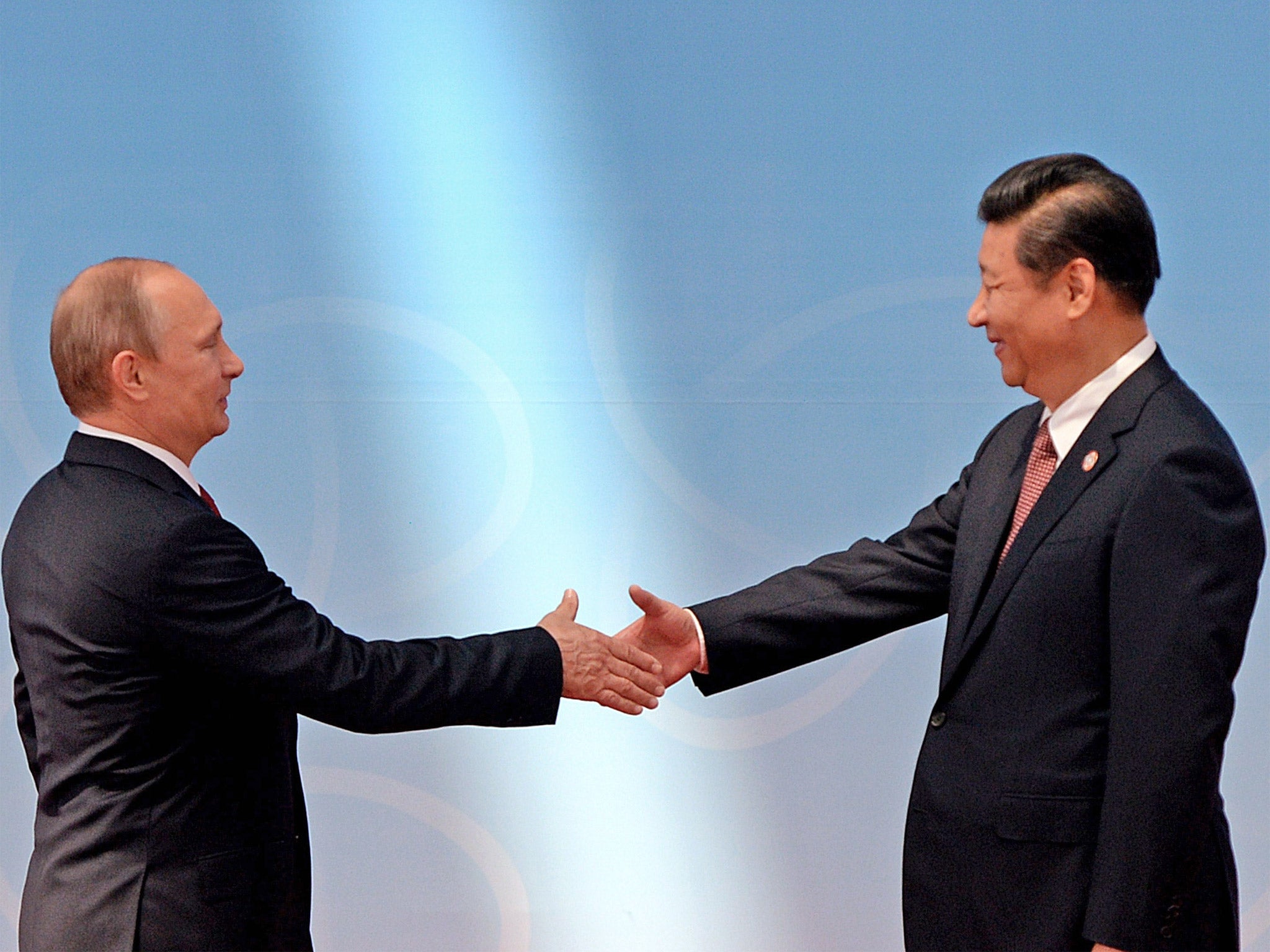Russia seals £237bn deal to sell gas to China
Triumphant Putin hails ‘strategic energy alliance’ that will lessen dependency on trade with Europe

Vladimir Putin snatched triumph from the jaws of humiliation today, overseeing with President Xi Jinping a $400bn (£237bn) deal to sell Russian gas to China. The signing between Gazprom and the China National Petroleum Corporation, which had been widely expected to happen during the hours of daylight, finally came at 4am, shortly before Mr Putin flew back to Moscow.
“This is the biggest contract in the history of the gas sector of the former USSR,” Mr Putin claimed after the signing in Shanghai.
“Our Chinese friends are hard, difficult negotiators. Through mutual compromise we managed to reach not only acceptable but rather satisfactory terms on this contract for both sides. Both sides were in the end pleased by the compromise reached on price and other terms.”
The deal, which has been more than 10 years in the making, lent substance to President Putin’s boast – more urgent since the onset of the Ukraine crisis – that Russia is weaning itself from dependence on trade with Europe, and embarking on a profitable new adventure in Asia.
Before the signing Mr Putin spoke of Russia moving towards a “strategic energy alliance” with China, claiming: “The arrangements on export of Russian natural gas to China have nearly been finalised”.
But a one-on-one meeting between Putin and his Chinese counterpart passed without an announcement and experts began writing off Russia’s heavily trailed hopes of a deal.
However, Russian sources insisted that the agreement was practically in the bag, and so it eventually proved. The agreed price of $350 per thousand cubic metres was seen as roughly midway between Russia’s lowest demand and Beijing’s highest offer. The agreement was not only a commercial but also a diplomatic coup for the Russians.
With China’s traditional emphasis on the sacrosanct nature of territorial integrity and its rejection of separatist movements – condemned again today by Mr Xi – Beijing was diplomatically dubious about Russia’s seizure of Crimea, and abstained in votes at the UN Security Council and General Assembly.
Dr Bobo Lo, an expert on Sino-Russian relations at the Royal Institute of International Affairs, told The Independent: “China was not happy that Russia took Crimea and was destabilising Ukraine.”
But principle is one thing and political pragmatism another. “China gains from Russia’s deteriorating relations with the West,” Dr Lo said. “China is the big winner from the Ukraine situation. Putin has taken the line that Western sanctions will not hurt us as we are not that dependent on exports to the West, because of our access to Asian markets. The gas deal, 10 years in the making, is the symbolic, iconic agreement.”
The deal comes as Russia faces growing diplomatic isolation. Moscow had been working hard on building its relations with Japan, hosting three visits by the Japanese premier, Shinzo Abe, in the past year. But all that changed with the imposition of sanctions over Ukraine.
However reluctantly, Japan, as a fully signed-up member of the Western alliance, could not get out of imposing them. “As a result,” said Dr Lo, “Russia has no one to turn to but China. The Ukraine crisis has been a strategic windfall for China.”
In Moscow the agreement was hailed with expressions of joy. The Russian-language Gazyeta news website declared it “a victory for Russian diplomacy – Russia dictated the price to China”. Experts cited by the website claimed that China’s only alternative would have been to buy liquid natural gas from Qatar at twice the price eventually agreed in Shanghai.
Mikhail Margelov, head of the foreign affairs committee in the upper house of Russia’s parliament, called Putin’s China trip “a major step towards a strategic partnership of the two nations”. Alexei Pushkov, a senior Russian parliamentarian and Putin loyalist, tweeted, “B. Obama should abandon the policy of isolating Russia, it will not work.”
The $350 price is close to what Russia charges its European customers, though delivery costs are higher partly because of the much greater distance of delivery. Russia will now spend $50bn on constructing a dedicated pipeline from eastern Siberia, while China has agreed to chip in an additional $20bn for the necessary infrastructure.
3579905869001
Dr Lo went on: “With this deal, Mr Putin sends a clear message. He is saying: you Europeans – we have plenty of other opportunities to do business. The future is not with you but with Asia, starting with China, and proceeding from there. ‘The Russian turn to the east’ is no longer a mere figure of speech: it’s actually happening.”
The agreement comes after both Russia and China have been under intense pressure from the US and the EU over their increasingly self-assertive foreign policies.
Russia has drawn the most vehement denunciations and sanctions, but there is grave disquiet in the West about China’s increasingly confrontational naval policies in the South and East China Seas, where there have been bruising confrontations with Japan, the Philippines and most recently Vietnam over disputed lumps of rock which may sit near unexplored oil or gas reserves.
So it was no accident that President Xi seized the opportunity offered by Mr Putin’s visit, and the historic gas deal, to call for closer security co-operation in Asia, including both Russia and Iran, while excluding the West and its friends. Speaking to an audience that included Mr Putin, President Xi said: “We need to… establish a new regional security co-operation architecture.”
A new alliance that really works may prove elusive. But there is no doubt that Russia and China have opened a new page.
Subscribe to Independent Premium to bookmark this article
Want to bookmark your favourite articles and stories to read or reference later? Start your Independent Premium subscription today.

Join our commenting forum
Join thought-provoking conversations, follow other Independent readers and see their replies